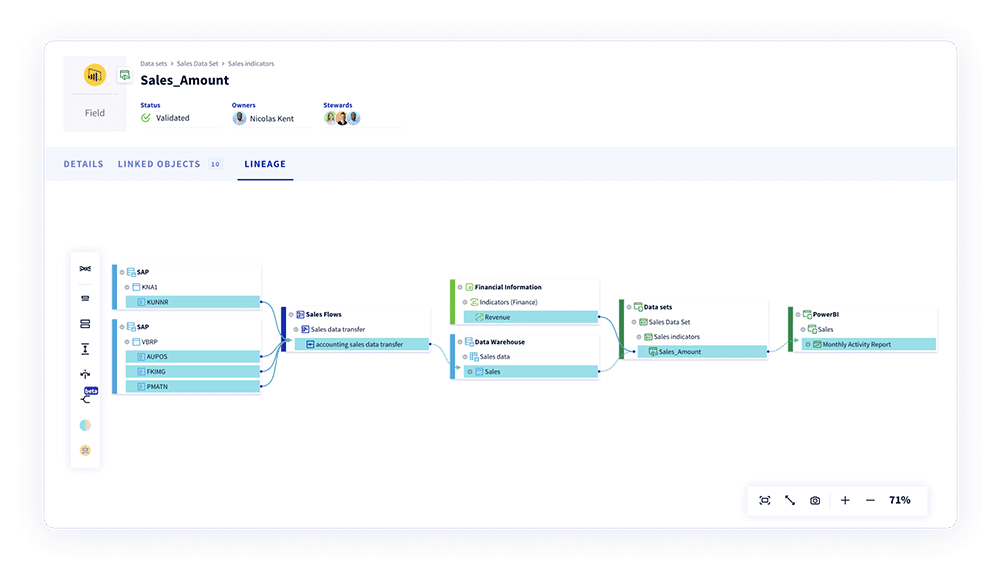
5 benefits of tracking data lineage for your business
Data lineage is essential for organizations relying on complex data ecosystems to drive their decision-making processes.
By understanding the intricate journey of data – from its source to its destination and the transformations that occur along the way – organizations can ensure data accuracy and integrity.
This article highlights the top five benefits of implementing organizational data lineage for data professionals.
What is data lineage?
Data lineage is a comprehensive representation of the lifecycle of data within an organization, capturing its origin, movements, transformations, and dependencies throughout the data pipeline.
By tracing the data’s journey from source to destination, data lineage offers a detailed understanding of how it is extracted, transformed, loaded, and integrated into various data warehouses, reporting systems, and data lakes.
This visibility into the data’s history, context, and relationships ensures that data professionals can analyze, monitor, and optimize data flow to ensure improved accuracy and efficiency.
Top 5 benefits of data lineage for modern businesses

Improved data quality
Data quality is critical for making informed decisions, and data lineage plays a pivotal role in enhancing it.
By providing a clear understanding of the data’s origin, transformations, and dependencies, data lineage provides root cause analysis that helps organizations efficiently identify and address data quality issues.

Reduced technical debt
Incorporating data lineage into a robust data governance framework can significantly reduce technical debt by streamlining data storage, access, consolidation, and integration.
Data lineage can also help enable organizations to maintain a consistent and efficient data infrastructure while reducing redundancies and repetitions.

Enhanced impact analysis
Data lineage allows organizations to swiftly identify data assets affected by modifications, enabling prompt impact analysis.
It is crucial to work quickly to identify, locate, and prevent adverse downstream effects, and data lineage helps mitigate inadvertent disruptions to data assets by providing a clear view of data dependencies and interrelationships.

Increased trust in data products
Data lineage fosters trust in data products by offering insight into underlying data processes and transformations. When users have confidence in the systems, processes, and data they work with, they are more likely to engage with and utilize these resources effectively.
As such, data lineage empowers users by promoting transparency and trust in data-driven decision-making.

Regulatory compliance
Data lineage supports regulatory reporting, which is tailored to specific use cases and industry requirements. It is essential to comply with stringent data privacy regulations and ensure that organizations adhere to the necessary guidelines.
By providing a detailed view of data’s journey and transformations, data lineage enables organizations to demonstrate their compliance with various local, national, and worldwide data regulatory standards.
Why is it important to track data lineage?
In addition to the benefits listed above, there are several reasons why data lineage tracking is crucial for organizations with complex data ecosystems.
Improved collaboration & communication
Data lineage fosters collaboration among various project stakeholders, including data scientists, analysts, engineers, and business users, by providing a shared understanding of the data landscape. This common view of the data’s journey and dependencies facilitates effective communication, leading to more informed and efficient decision-making across the organization.
Facilitates data discovery
Data lineage helps organizations discover and catalog their data assets more effectively. By tracing the data’s journey, data professionals can identify relevant data sources and attributes, streamlining data discovery and improving data accessibility for various business processes.
Change management
Data lineage is essential for managing changes within the data ecosystem, such as system upgrades, data migrations, and schema modifications. By providing a clear view of data dependencies, data lineage enables organizations to plan and execute changes more effectively, minimizing the risk of unforeseen consequences to downstream systems and processes.
CDO Masterclass: Upgrade your data leadership in just 3 days
Join DataGalaxy’s CDO Masterclass to gain actionable strategies, learn from global leaders like Airbus and LVMH, and earn an industry-recognized certification.
Save your seat!Data security & privacy
Data lineage contributes to improved data security and privacy by offering insight into the ways sensitive data is processed, stored, and accessed throughout the organization. This information allows organizations to identify potential vulnerabilities and implement appropriate safeguards to protect sensitive data, ensuring compliance with data protection regulations.
Provenance & accountability
By maintaining a clear audit trail of data movement and transformations, organizations can trace data back to its original source, ensuring the authenticity of the data and providing a clear view of the parties responsible for any changes or modifications.
The DataGalaxy difference

DataGalaxy offers intuitive data lineage that employs a modern metadata management solution, providing in-depth information about conceptual data on a large scale. Users can now comprehend and track technical and inferential metadata, enabling a more intricate and purposeful data relationship.

Follow the complete path of your data

Comprehensive overviews in the blink of an eye

Automated column-level analysis to prevent risks
FAQ
- Why is data lineage important?
-
Data lineage is important because it provides visibility into the origin, movement, and transformation of data. It enables regulatory compliance, faster root-cause analysis, improved data quality, and trust in analytics. By mapping data flows, organizations enhance transparency, streamline audits, and support accurate, AI-driven decisions, making it a cornerstone of effective data governance.
- Why is metadata important?
-
Metadata explains what data means, where it comes from, and how to use it. It simplifies finding, organizing, and managing data, boosting trust, compliance, and decision-making. Like a roadmap, metadata gives teams clarity and confidence to work efficiently.
- What is reference data?
-
Reference data categorizes other data—like country or currency codes—and provides a stable framework for consistency across systems. Proper management supports data quality, compliance, and operational efficiency by ensuring accurate, reliable reporting and analysis.
- What is reference data management?
-
Reference data management oversees classifications like country codes or product categories across systems. Since it’s widely shared, consistency and accuracy are essential. Centralized management boosts efficiency, ensures compliance, and supports better decisions through a unified view of key business terms.
